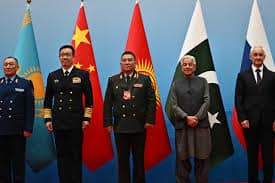India faced a diplomatic setback during the Shanghai Cooperation Organization (SCO) Defence Ministers’ meeting held in Qingdao. Most member countries, including China, Russia, and Iran, disagreed with India’s position regarding Pakistan, creating tensions during the session.
A joint statement, or communiqué, was prepared by the group to highlight regional security issues. The document mentioned terrorism in Balochistan but did not refer to the recent deadly attack in Pahalgam, India. This led India to refuse to sign the statement, saying it did not fully address its concerns.
Despite India’s objection, all other SCO member states agreed to and supported the joint communiqué. This left India as the only country that chose not to endorse the final document.
The disagreement shows the growing divide between India and some of the other SCO countries on how to address terrorism and regional conflicts.
India believes the international community should equally acknowledge and condemn all terror attacks, including those happening within its borders. However, the exclusion of the Pahalgam attack from the communiqué was seen by India as an unfair and one-sided approach.
The SCO, which includes major powers like China and Russia, aims to promote cooperation on security, defence, and counterterrorism. However, this incident highlighted how sensitive political differences between member states can affect unity and agreements within the group.
India’s refusal to sign the statement marks a rare moment of division in the usually unified SCO, raising questions about future collaboration on regional security matters.


